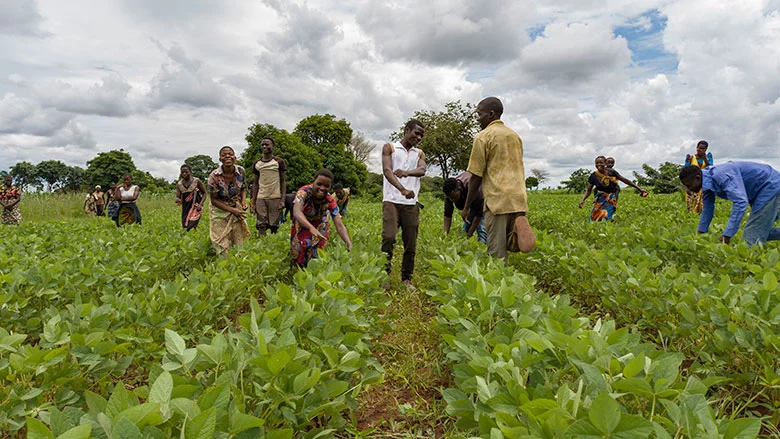Mid last month, I joined a select group of agriculture industry players and guests at a one-day conference held at the NAF Conference Centre in Abuja. Coming at a time when the sector is facing some of the most formidable challenges worldwide with food prices galloping away from the reaches of the common man, the venue of the conference was a veritable ground to catch up on what’s new in our arsenal as we prepare to face the situation. The conference put together by Sahel Consulting and tagged ‘Curbing the Nigerian Food Crisis: Ensuring Resilience and Sustainability in the Agribusiness Landscape’, was attended by over 300 participants across the public, private, donor, non-profit and civil society sectors.
The whole idea was to highlight critical questions around food and nutrition security in Nigeria and discuss opportunities to build a more resilient and equitable food system by investing in Nigerian agribusinesses. The host, Sahel Consulting, has been in the lead in this kind of advocacy work. I have, sometimes, on this page noted the pivotal role they are playing in the advancement of the dairy industry in the country. This refers to the central role they are playing in the implementation of the ALDDN project – Advancing Local Dairy Development in Nigeria – with funds from the Melinda Gates Foundation, and in partnership with the Federal Ministry of Agriculture as well as Kaduna, Kano, Jigawa, and Plateau states.
The ALDDN is a five-year programme that is expected to hasten the process of the emergence of a vibrant local dairy sector in an inclusive way that improves the livelihoods, productivity, nutrition, and empowerment of smallholder women and dairy farmers and the communities in which they live. The dairy processor partners are Arla in Kaduna, Integrated Dairies in Jos, L&Z Integrated Farms in Kano, Majestik Dairy in Birnin Kudu, Jigawa State, Saj Foods in Zaria, and Sebore Farms in Adamawa State. In this regard, I attended their conferences in Kaduna and Abuja and have also visited L&Z’s splendid farm outside Kano City. I have also had the opportunity to go down to the Damau Household Milk Project with Arla and Milcopal to inspect the off-takers project.
But this is a different ball game as these conference discussions straddled the entire spectrum of the agricultural industry. Various government dignitaries graced the opening. I noted the presence of Adeniyi Adebayo the Minister of Industry, Trade, and Investment, who is now fast becoming a legend at prompt appearances at events always arriving before the scheduled time. The minister of Agriculture and that of Budget and National Planning were represented. There were a host of supporters also ranging from the German Agency for International Corporation (GIZ), the Bill and Melinda Gates Foundation, to the Central Bank of Nigeria (CBN), and several others. They all gave soothing goodwill messages at the conference highlighting their contributions to the agricultural development efforts.
This was followed by a panel discussion on Food System Transformation in Action. It was the centrepiece of the conference which I found most interesting as the panel featured entrepreneurs with dynamic business models running across different agricultural value chains. The panel included Aminu Nyako, CEO, Sebore International Farms, Anthony Job, Group Technical Head, Value Seeds Ltd, Nkiru Okpareke, CE0, EnviroGro Farms, Winifred Okafor, CEO, Bonita Treats, Ayodeji Balogun, CEO, AFEX. And Kolade Dada of SARO Africa. The discussion highlighted scalable evidence-based solutions as well as profitable and innovative approaches being applied toward curbing the food crisis in Nigeria.
I found the presentation of Aminu Nyako of Sebore Farms very fascinating. He runs one of the most progressive farms in Nigeria now, which has just commissioned a new dairy factory, said to be the largest in Nigeria that can process 150,000 litres of milk daily. Sourcing the milk from as many as 12,000 independent cattle breeders the factory turns out different varieties of yogurt which it exports along with other products of the farm. The model, as explained, is a win-win as it benefits the farmers as well by providing them with a guaranteed market for their goods, while Sebore Farms, the off-takers processing, and packaging operations ensure that the products gain value before being sold.
A second high-level dialogue ensued, discussing: The looming food crisis – What have we learned, what are we doing to curtail this disaster, and what more can we do? The panellists included Ms Mariska Lammers, First Secretary Food Security & Climate, Netherlands Embassy Abuja, Ms Leila BenAmor Mathieu – Head, Human Development, Delegation of the European Union to the Federal Republic of Nigeria and ECOWAS, and Ms. Aggie Konde, Vice President, Program Innovation & Delivery at AGRA. The dialogue highlighted learnings from other world regions in addressing the food crisis, and shared strategies on how to ensure donor alignment and build for long-term sustainability given the challenge of climate change and other shocks.
A major highlight of the conference was the interactive and insightful breakout sessions where discussions focused on success factors for developing private sector-led initiatives to drive transformation in the Nigerian agribusiness landscape, and highlighted steps for developing a clear roadmap for multi-sector collaborations to curtail the food crisis in Nigeria.
A successful outing for a one-day event hoping in the future more participants will be drawn from the states and local governments, key linkages in whatever outcome you envisage at attempting reforms in the agriculture chain.

 Join Daily Trust WhatsApp Community For Quick Access To News and Happenings Around You.
Join Daily Trust WhatsApp Community For Quick Access To News and Happenings Around You.


